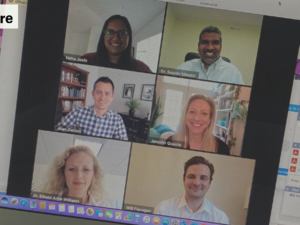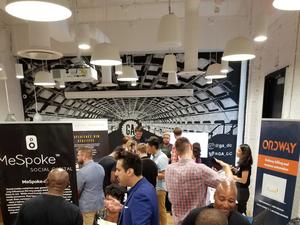InTheCapital officially kicked off its first-ever part-day business conference called State of Innovation on Thursday, hosting a wide variety of top-tier industry professionals with education, policy, health, VC and marketing backgrounds. Brilliant thought leaders made up the attendees crowd at Arena Stage to hear about what's shaking up the innovation realm here in the D.C. area. They heard from former D.C. Mayor Adrian Fenty, Director of Marketing for LMO Advertising Sherri Anne Green, founder of Disruption Corporation Paul Singh and the always chipper Helen Quick, partner at Nelson Mullins Riley & Scarborough LLP.
The education panel was what immediately caught my interest at State of Innovation, which should come as no surprise given my background. While it was extremely rushed to the point that the panelists didn't even make it past the second of 10 slides, there's something to be said about the clashing of bright academic minds that transpired over the course of the 30 minutes of time allotted.Chip Paucek, CEO of 2U; Richard Culatta, Director of the Office of Educational Technology at the U.S. Department of Education; Phil Bronner, CEO of Quad Learning and Elana Fine, managing director of the Dingman Center for Entrepreneurship at University's of Maryland's Robert H. Smith School of Business did not always agree when it came to the questions asked by moderator Doug Lederman, co-editor and co-founder of Inside Higher Ed, offering a behind the scenes look at what it's like to work in the higher education industry.
For example, when asked if investors will continue to pump money into edtech, Bronner said, "I think most investors believe significant education companies will be built and will continue to invest." Already, Bronner added, investment has grown to $1.5 billion. Though Fine echoed Bronner's point, she warned that investors will have to see which business models will work in order to determine which companies to back. "Some will fail," she said, "but there will be others that succeed." There's such a direct pipeline edtech companies that at some point investors have to make a bet and see what works and what doesn't.
Paucek mentioned that VC's pick winners. 2U is his third startup and he isn't afraid to admit that it's hard to build a business and most don't end up working out. "What is notable is the fact that we [2U] did IPO and make an exit that wasn't just another acquisition by Pearson," he said. 2U is paving the way for real companies to get to scale. "We certainly will not be the last to IPO," Paucek continued. Bronner complimented Paucek's company, too, saying that "2U gives confidence to the sector.
Culatta, on the other hand, talked about how 70 percent of K-12 schools still aren't connected to the Internet. It's those types of failings that make him believe we're underinvesting in edtech.
As for what the panelists believe will fuel the growth of the edtech industry, Paucek said that outcomes matter. "Long term, if we continue to drive high-quality experiences, we'll get high-quality outcomes."
Fine called for young entrepreneurs interested in pursuing edtech businesses to take advantage of the opportunity. We have so many resources and startups here," she explained. "Stick at it because the mission is personally fulfilling."
As for the panelists' responses to other prompts pertaining to the future of higher education, check out the slideshow below.




